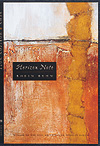|
Bookshelf
Page 2
 Schizophrenia
Revealed: From Neurons to Social Interactions Schizophrenia
Revealed: From Neurons to Social Interactions
By Michael Foster Green '79
W. W. Norton & Company, 2001
Scientists have just recently begun to understand the causes and
treatment of schizophrenia, drastically changing their view of the
illness. An eminent scholar and skillful storyteller, Green weaves
together information on the new generation of medications and recent
findings from brain imaging and genetics. The result is a book "suitable
for the most informed professional but with a clarity appropriate
for an interested newcomer," according to a colleague. Green
is a professor of psychology at UCLA.
 Lucy's
Letters: A Mother's Gift Lucy's
Letters: A Mother's Gift
By Nancy Langer Schlecht
WigWam Publishing Co., 2001
Margaret Lucille Diebold '33 was a curiously intelligent individual
who found joy in sharing her life through letters, essays, and poems
with candor and wit. From her college days at Oberlin to her years
as a senior citizen, this book chronicles her lifetime of dreams,
sorrows, and joy as told by her daughter.
The Social Construction of the Ocean
By Philip E. Steinberg '87
Cambridge University Press, 2001
This innovative text uses political geography and international
relations to examine how nations and peoples have viewed and used
our world's oceans. Most social scientists view the seas as a resource,
but Steinberg sees them as a space defined by society, arguing that
politics and economics have shaped the governance and representation
of the sea as much as they have the land. An assistant professor
of geography at Florida State University, he has been published
in Society & Space, World Bulletin, and Urban
Geography.
The Religious World of Antislavery Women:
Spirituality in the Lives of Five Abolitionist Lecturers
By Anna M. Speicher '80
Syracuse University Press, 2000
This insightful book examines radical abolitionist women and their
conflicts between religion and their personal and political goals.
Included here are 19th-century reformers such as Angelina Grimke,
Sarah Grimke, Sallie Holley, and Lucretia Mott, women who chose
to "reject the repressive features of Christianity" while
maintaining their religiosity. Speicher bravely explores their evolving
faith and focuses on the leadership skills within the women's antislavery
circles. She is an independent historian and consultant in the Chicago
area.
Philosophy of Balanced Reasoning
By Joseph Okechuku Nzelibe '63
1st Books Library, 2001
This philosophical book appeals to those with an active, objective
imagination and a willingness to reach for more than the obvious.
Nzelibe believes that people gravitate toward perceptions of personal
satisfaction without reasoning through to the root of the personal
gain, whether it be money, power, or glory. This one-sided view
of gain without an understanding of cause has led to growing discussions
of destruction and killing. Here, he claims that balanced reasoning
about things typically considered evil will bring about peace.
 Horizon
Note Horizon
Note
By Robin Behn '79
The University of Wisconsin Press, 2001
Winner of the 2001 Brittingham Prize in Poetry, Behn "owns
the ability to turn speech into music, even as it resists and questions
the slippery, beloved, difficult stuff it's made of," according
to a literary critic. This collection of poems covers a range of
topics, from her infant son's fresh encounters with words to those
of her father struggling with Alzheimer's disease. Her lucid words
are often seen as blinding, for they fly quickly from vector to
intelligent vector, sometimes proximal, sometimes distant. Behn
is the recipient of fellowships from the Guggenheim Foundation and
the National Endowment for the Arts, as well as the author of two
previous collections of poetry, Paper Bird and The Red
Hour.
Introduction to U.S. Health Policy:
The Organization, Financing, and Delivery of Health Care in America
By Donald A. Barr '68
Benjamin Cummings, 2001
A practicing physician and academic sociologist, Barr introduces
the organizations and institutions that make the U.S. health care
system work (or not work, as the case may be). He explains the dilemmas
confronting policy makers, providers, and patients: how to balance
cost, quality, and access, and he examines specific health care
organizations such as hospitals, managed care organizations, and
government health care programs.
Page 1
| 2 | 3 of Bookshelf
|

